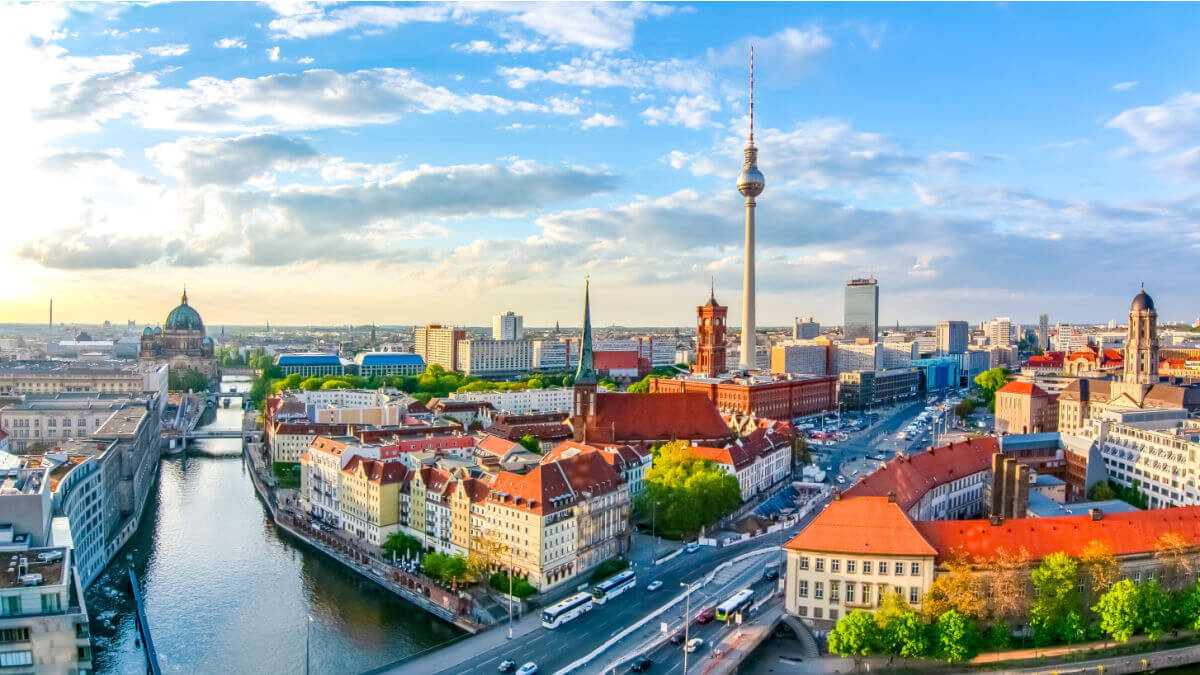Moving to Germany from the UK: a complete how to guide
Thinking of taking the leap and moving to Germany? You’re not alone, since over 80,000 Brits already call Germany their home.¹ If you like living in a stable...

Germany is an increasingly popular place for retirees, thanks to its stable economy and strong healthcare system. There are large expat communities throughout Germany, so whether you're a Brit, an American or an Australian you might be considering joining them and setting up your home to enjoy expatriate life in retirement. The country offers vibrant cosmopolitan cities, a long northern coastline, beautiful countryside and mountainous areas for the more adventurous. Wherever you choose to settle, there will be plenty to explore.
If you’re considering retiring in Germany, you’ll need to know a bit about how to go about arranging your move and the type of lifestyle you can expect there. Here’s a complete guide to how to retire in Germany as an expatriate.
Germany is one of the 11 founding members of the Eurozone, with euros coming into circulation as the only legal tender as of 2002. Other currencies aren’t widely accepted, so you’ll need to open a German bank account and get used to using euros when you retire in Germany.
Exchange rates rise and fall, so it’s worth keeping an eye on the market so you know what your money will be worth in Germany. You can always get the most up-to-date figures by using anonline currency converter, but at the moment here are some general, rounded figures to give you a basic understanding:
Germany is a developed country and the standard of living is high. This means that life isn’t cheap, but you can usually find everything you need to live a comfortable life fairly easily, even in relatively rural areas.
The data site, Numbeo, provides average cost of living data which can give a valuable insight into the prices of everyday essentials, entertainment and travel in different locations.
| Regular goods | Average price in Germany (EUR)* |
|---|---|
| Three course meal for two at mid-range restaurant | €45.00 |
| One litre of milk | €0.69 |
| Loaf of white bread | €1.26 |
| Bottle of wine (mid-range) | €5.00 |
| Petrol (One litre) | €1.32 |
| City centre apartment rental (One bedroom) | €649.43 |
| City centre apartment rental (Three bedroom) | €1,249.14 |
These calculations are from Numbeo, which aggregates cost of living figures entered by locals. They are an average across the country. Therefore, the actual costs will vary by region and city.
It’s definitely a good idea to do your research, and take into account all the costs connected with retiring in Germany.
One expensive pitfall for many expats is the high fees levied for international money transfers. If you need to regularly move money from a bank account at home to your German bank account, then it’s good to know that your home bank might not be the cheapest option for this service. Often, banks apply high charges for international money transfers that you may not be aware of. Even if they claim to be fee free, their charges are hidden into inflated exchange rates.
A much better option is a specialist service like Wise, where you can move your money from one country to the other using the real exchange rate and with a low fixed fee - leaving you with more money to enjoy your retirement.
The cost of living in Germany varies enormously based on the type of lifestyle you lead and where you choose to live. Numbeo estimates that a single person in Berlin would need over €726 a month to live, excluding rental costs. Life in Berlin is actually cheaper than in many other German cities, so you have a good chance of finding affordable options for necessities like a rental home if you’re looking to let a place and retire comfortably in the capital. Of course, you might prefer to buy a property in Germany, which could bring down your daily expenses significantly.
One person would need around €788 a month to live (excluding rent) in Munich, but there are other cities you might consider if you’re looking to live on a more modest income. Some other regional cities are significantly more accessible in terms of cost of living. A monthly income of just over €660 will be enough to live in Dresden, for example, while less than €700 should also cover your costs (excluding rent) in Leipzig.
Life in any city in Germany is going to be relatively costly, so if you’re looking to retire cheaply in Germany, then going for a smaller town or more rural property is your best bet. With a modest lifestyle, then you can retire relatively cheaply in Germany.
You can estimate the cost of living in Germany based on the city you're interested in and your own lifestyle online.
Germany is a large country with a varied geography leading to differences in the temperatures and climate in the regions. The long term averages, of course, don’t reflect day to day changes in temperatures, and summer in the city can still be sweltering with highs well into the mid thirties celsius (pushing 95°F). There are also mountainous areas of Germany, which naturally have much harsher winters and cooler summers.
| City in Germany | Winter Average Lowest Temp | Summer Average Highest Temp |
|---|---|---|
| Berlin | -3°C (°27F) | 22°C (72°F) |
| Hamburg | -1°C (30°F) | 21°C (71°F) |
| Cologne | -1°C (30°F) | 22°C (72°F) |
| Frankfurt | -1°C (30°F) | 23°C (73°F) |
| Munich | -4°C (25°F) | 22°C (72°F) |
| Stuttgart | -2°C (28°F) | 22°C (72°F) |
The pastimes available for retirees will vary depending on the type of community you choose to live in - but wherever you go, you'll find groups of like minded people to share your hobbies with.
Because of the large expat population, many German cities have English speaking social clubs, which arrange meetings (usually over food and drinks!), outings to the theatre, evenings of music or trips to visit other areas of Germany. Pickwicks in Frankfurt, which was established over 40 years ago, is a great example of this, with events which are perfectly suited to newly arrived seniors.
Aside from purely social clubs, you can find interest groups such as book clubs, local branches of the International Rotary Club, golfing societies and much more. You’ll find what’s on offer in the area of Germany you choose to settle in with a quick Google search.
Germany is a large and varied country. Berlin is Germany’s capital city and the country’s largest. One of the most populous cities in Europe, Berlin is home to fantastic architecture, and a wide range of cultural activities and festivals. Rental prices in Berlin are still reasonable - although they've been rising of late, and the property market is getting more competitive. The very centre of Berlin can be quite congested, and - like any large city - some neighbourhoods are safer than others. Because of strong public transport links many expats choose to live in one of the outlying towns, where they can have a slower pace of life and still get to the capital easily. You might consider, for example, Potsdam - a historic city out of Berlin to the south west, only a 40 minute train ride or drive into Berlin city centre. Or to the north of Berlin, you can also choose Oranienburg, or Wandlitz, an attractive area close to nature reserves.
Munich is the third largest city in Germany, but with the highest standard of living available in the country, according to the Mercer Quality of Living survey. However, it’s not cheap - for example, rental accommodation in Munich is much more expensive (41% more, in fact) than finding a place in Berlin. Munich is a cultural hub and attracts people from all over the world. You’ll find a large expat community if you choose to retire here. It’s also a very safe city, with crime levels ‘very low’ pretty much across the board, according to data from Numbeo. You can compare thecrime rates in Munich with your home city online.
Naturally, life in a big city might not be your preferred retirement, and there are plenty of smaller towns which are very liveable with great amenities and plenty to do. You might consider the mediaeval town of Heidelberg for example, in South West Germany, which has a historic university and plenty of sights to explore. Try Heidelberg Castle, which is a classic example of Renaissance architecture, or simply relax with a coffee in one of the cafes lining the squares of the old town centre.
Germany is a member of the EU, so EU, EEA and Swiss nationals can live in Germany visa-free. This means if you’re a Brit looking to retire in Germany you don’t need a visa, but you'll have to visit the Einwohnermeldeamt (resident registration office) at your local town hall, within the first two weeks of being there to register your residence. You’ll be asked to show some documentation, so it’s worth calling in advance to confirm exactly what you need to take along.
If you’re an American citizen planning to retire in Germany, it’s possible to enter Germany without any visa, for a stay of up to 90 days, and apply for a residence visa during that time. However, it’s usually best to apply in your local consulate before you travel, to avoid any delays or issues.
Visas are issued by the German Consulate closest to your home in America. You’ll have to attend a meeting in person, and your application should usually be made about three months before you intend to travel. Each consulate will have a slightly different way of arranging appointments, so you should check with your local consulate to get the full detail.
Australian citizens looking to retire in Germany can follow the same process, applying for a residence visa at a German consulate in Australia, or entering Germany and making an application to stay for longer after arriving.
The residence visas which are issued are usually good for a year initially, and can then be renewed afterwards. Once you’ve lived in Germany for five years, it’s possible to apply for a settlement permit, although this requires candidates to have a working knowledge of the German language and culture.
The German Government provides a guide to all aspects ofmoving to Germany, which is available online. This is a great place to start when you’re considering the steps needed to be able to retire in Germany.
If you're planning to retire to Germany, you're in good company. Many people from all over the world have already made the leap, so whatever lifestyle you choose for your retirement, you’ll find an active community to welcome you.
Good luck and enjoy planning your dream retirement in Germany.
*Please see terms of use and product availability for your region or visit Wise fees and pricing for the most up to date pricing and fee information.
This publication is provided for general information purposes and does not constitute legal, tax or other professional advice from Wise Payments Limited or its subsidiaries and its affiliates, and it is not intended as a substitute for obtaining advice from a financial advisor or any other professional.
We make no representations, warranties or guarantees, whether expressed or implied, that the content in the publication is accurate, complete or up to date.

Thinking of taking the leap and moving to Germany? You’re not alone, since over 80,000 Brits already call Germany their home.¹ If you like living in a stable...

A guide that explains the German residence permit, how it works, who can apply, how to apply and costs.

Are you or your partner expecting? While this is meant to be a very exciting time in your life, sometimes medical expenses and navigating public or private...

Germany is so much more than sausages and beer. The country boasts incredibly low unemployment, a high quality of life, and a wonderful mix of history,...

Holidays in Germany are celebrated differently than in many parts of the world. Germans take their holidays very seriously, with celebrations that are steeped...

Germany is already home to a healthy expat community and a thrivng tourism industry. From the parties and rich culture of Berlin, to the rich food and medival...